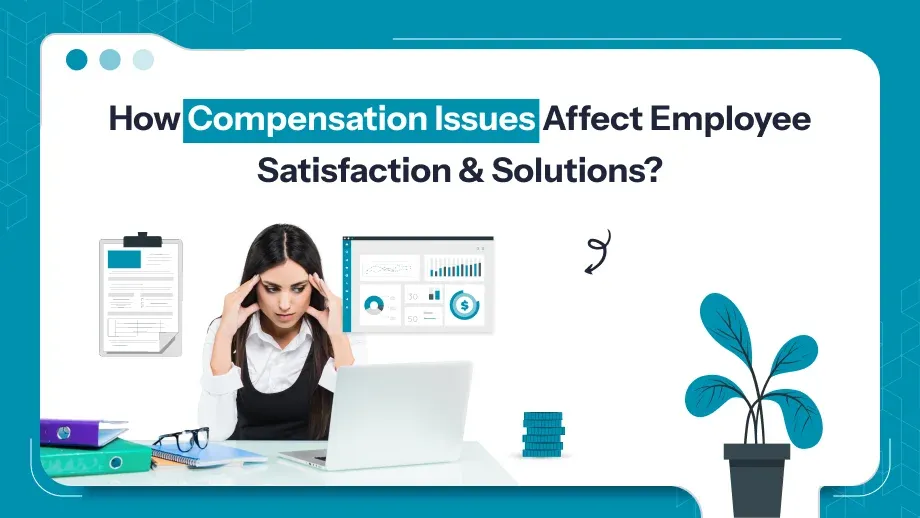
In today’s highly competitive work market, Compensation Issues have been a significant concern both for employees and employers. Compensation Plan is a crucial aspect that cannot be understated as it is a key factor in the satisfaction of employees as well as retention and organization’s success. Businesses that do not tackle compensation concerns could be faced with low morale of employees, decreased efficiency, and an increased percentage of turnover. This blog will explore the most frequently asked questions about compensation and their effect on the satisfaction of employees, as well as effective solutions for overcoming these issues.
Understanding Compensation Issues
The term “compensation” refers to problems or disagreements that relate to the employee’s pay, benefits, and the overall structure of compensation. The problems could be from a variety of reasons such as incorrect pay structures or pay structures that are not equal for the same job, or poor compensation programs that do not conform to industry standards.
Common issues with compensation include:
- Unequal Pay: If employees in similar positions or duties get paid different amounts without justification, this leads to anger and frustration.
- Employers: who aren’t competitive in their pay could lose talented employees to competition.
- Late Payments: Payroll-related issues including delayed salaries payment, may cause employees’ frustration as well as a decrease in confidence in the company.
- The lack of benefits: Lacking or no advantages, like bonuses, health insurance and retirement plans, may make employees feel demotivated.
How Compensation Issues Impact Employee Satisfaction
The effect of compensation issues on the satisfaction of employees is significant and complex. When employees are unhappy because they feel they’re not treated fairly or with a fair amount of respect this can have a variety of negative consequences.
1. Decreased Motivation and Engagement
Workers who are faced with Compensation Issues have a lower chance of being enthusiastic and motivated in the work they do. It is possible that they feel the hard work they put into it isn’t properly recognized or appreciated and this can result in lower levels of satisfaction with their jobs. In time, the lack of motivation may affect productivity as well as the level of performance measurement, which affects the company’s overall efficiency.
2. Increased Employee Turnover
One of the major results of compensation issues is that employees lose their jobs. Employees who feel devalued or overpaid tend to look for work in other places. It also means additional expenses to companies, in terms of recruiting, training and onboarding new employees.
3. Reduced Trust and Morale
If compensation concerns arise when compensation issues arise, employees might lose confidence in the management of the business as well as HR policies. Lack of transparency about pay scales and the absence of clear information regarding the policies regarding Importance of Compensation can seriously harm the morale of employees. It could create a hostile workplace and hamper collaboration within teams.
4. Negative Employer Brand
Businesses that do not address concerns regarding compensation issues affecting their brand image as an employer. The word spreads fast, and employees are likely to post their complaints through social media sites as well as on employer review sites that can deter potential applicants from submitting applications. An unfavourable reputation for pay can last for a long time and have a negative impact on the recruitment process.
Challenges in Compensation Management
The management of compensation matters effectively will be a difficult task for the HR department. Here are some of the major challenges of compensation faced by companies:
1. Affiliating Compensation to Market Trends
One of the main difficulties with regards to compensation issues is making sure that the salaries and other benefits are consistent with the market standard. If compensation rates for a firm are less than the industry standard they will be unable to keep high-quality employees. In contrast, the fact that you pay more than what is required can lead to excessive financial stress.
2. How to deal with budget constraints
There are many organizations that face compensation issues due to budgetary restrictions. Some companies may be in the process to offer competitive wages however the lack of resources makes it hard to satisfy the expectations of employees. Finding a balance between sustainability in finances and worker satisfaction is a continuous problem.
3. Addressing Pay Equity
A major issue in managing compensation is making sure that employees are paid fairly. Employers need to make sure that employees are compensated equally regardless of race, gender or other characteristics. Unfair pay for equal work isn’t just unethical, but it can result in legal consequences.
4. Ensuring Transparency and Consistency
A transparent approach to the way that compensation is organized and managed is essential to solving compensation issues. The employees must be aware of the process of determining their compensation and the factors that affect their salary and other benefits. If there is no transparency, employees could believe that hr payroll software india is unjust that could cause frustration and even disengagement.
5. Handling Payroll and Taxation Issues
Controlling tax and payroll-related matters is yet another aspect that can be complex in managing compensation. Particularly in areas such as India and India, where tax policy may change often. Employers should be informed of local regulations and employ instruments like HRMS or payroll software to guarantee that compliance is met and to improve efficiency in the management of payroll.
Solutions to Address Compensation Issues
Although compensation concerns are complicated, they can be efficiently solved through the use of a variety of processes, strategies, and instruments. Here are a few suggestions to solve these issues:
1. Create a Competitive Compensation Plan
One of the most efficient strategies to deal with compensation issues is to create an efficient compensation program. Find out the standards of industry for benefits and salaries in the market you are in and make sure that your pay packages are in line with the market. Employ market surveys as well as studies of the industry to compare the pay scales of your employees and then adjust when necessary.
2. Implement HRMS & Payroll Software
For effective management of compensation firms should invest in payroll software and HRMS. They can help simplify the management of payroll, guarantee precision, and minimize errors. Payroll software permits HR personnel to manage bonuses, salaries and tax payments efficiently and reduce the chance of compensation-related issues relating to payroll. If you work for a company that is located in India, Payroll management software India helps to make sure that they are in the compliance of local labor laws and tax rules.
3. Foster Pay Transparency
The transparency of compensation is crucial for building trust within a company. Employees must have access details about how compensation is decided, while managers must be transparent about aspects that impact salary selection. This helps lessen confusion and create a sense of inequity among employees.
4. Address Pay Equity
Employers are required to regularly evaluate their pay systems for fair pay throughout all departments and duties. Pay audits are a great way to identify differences, and appropriate action could be implemented to ensure employees are paid fairly. Unfair compensation issues due to unequal pay could cause legal trouble which is why it’s crucial to deal with them quickly.
5. Use Payroll Service Providers
Businesses who want to outsource their payroll and payroll management, working with a payroll company is a wise decision. The service providers are experts in tax and payroll compliance. This allows firms to focus on activities of their business. Payroll service provider will also assist in generating pay slips, accounting for taxes, and guaranteeing that payments are made on time.
6. Regularly Update Your Compensation Plan
In a constantly evolving work market, it’s essential to update and review your compensation program often. The economy’s changing as well as industry trends and the laws governing labor can affect pay structures. Keeping current ensures that your pay programs are competitive and fair.
7. Offer Non-Monetary Benefits
The majority of compensation concerns aren’t connected to salary. Other benefits that aren’t monetary, such as flexibility in work schedules and remote working options fitness programs, as well as professional development opportunities, are a great way to improve the satisfaction of employees. Although these benefits might not directly impact salary, they are a part of an overall compensation plan that the employees enjoy.
Conclusion
It is essential to address compensation issue to ensure employee satisfaction, engagement and loyalty. Through implementing strategies such as making a plan for a competitive salary and investing in HRMS & payroll software, encouraging openness to pay, making sure that employees have equity, as well as offering other advantages, companies can develop the right compensation system that will meet the requirements of employees as well as business. Regularly scheduled reviews, clear communication as well as utilizing the services of payroll providers are crucial to stay on top of possible challenges with compensation.
When you have these options in place it will help you not only solve the compensation issues, but you can also create an atmosphere that rewards and values employees. This will ultimately contribute to the long-term growth of your business.







